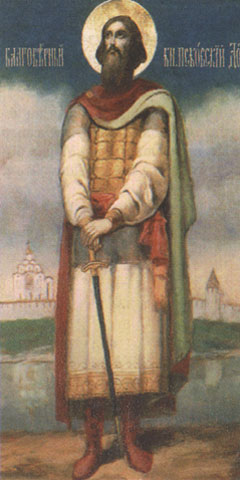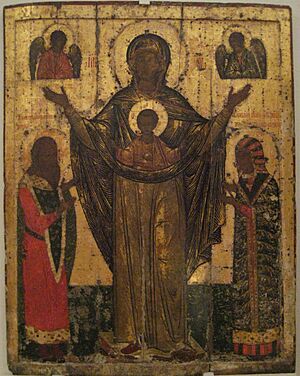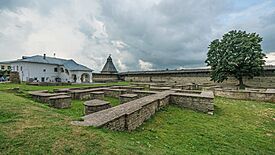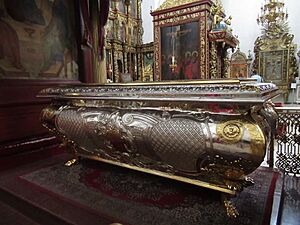Daumantas of Pskov facts for kids
Daumantas (also known as Domantas or Dovmont) was an important leader in the 1200s. He was born in Lithuania and later became the Prince of Pskov from 1266 until his death in 1299. During his time as prince, Pskov became almost completely independent from Novgorod, a powerful city-state nearby.
Daumantas is honored as a saint in the Eastern Orthodox Church. His special day is celebrated on May 20th.
Early Life in Lithuania
Before he became a prince in Pskov, Daumantas was a duke in Nalšia. This was a northern part of the Grand Duchy of Lithuania. He was an ally of King Mindaugas, who was the first and only king of Lithuania. Daumantas and King Mindaugas were even related by marriage, as their wives were sisters.
However, Daumantas later decided to join forces with Mindaugas' nephew, Treniota. Treniota was trying to gain more power in the kingdom.
In 1263, Daumantas was involved in the assassination of King Mindaugas and two of his sons. This event caused a lot of trouble in Lithuania. After this, Mindaugas' eldest son, Vaišelga, teamed up with Shvarn of Halych-Volhynia. In 1264, Vaišelga got revenge by killing Treniota. Because of these events, Daumantas and his followers had to leave Lithuania. They fled to the city of Pskov.
Becoming Prince of Pskov
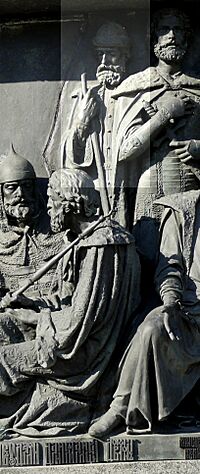
When Daumantas arrived in Pskov, he converted to Eastern Orthodoxy. He took the Christian name Timothy (Timofei). He also married the daughter of Dmitry of Pereslavl, who was the son of the famous Alexander Nevsky.
Daumantas quickly became a military leader for Pskov. He led Pskovian armies against the Lithuanians. He defeated them near the Western Dvina river. He also attacked the lands of Duke Gerdenis and captured his sons and wife. The people of Pskov were impressed by Daumantas' bravery and leadership. They chose him to be their knyaz, or military leader.
This choice was unusual because the Novgorod Republic usually controlled Pskov's affairs. The Prince of Novgorod, Yaroslav, wanted to remove Daumantas. But the people of Novgorod did not support Yaroslav. Instead, they joined forces with Pskov and invaded Lithuania together. Daumantas led this successful campaign.
Battles and Truces
In January 1268, Pskov and Novgorod worked together again. They invaded Danish Estonia. Daumantas led the Pskovian forces. They joined with Novgorodians led by Dmitry, Alexander Nevsky's son. They raided the countryside but were defeated by Danish, Livonian Knights, and local Estonian forces. This battle was called the Battle of Rakvere.
The next year, the Livonian Order attacked Pskov. They burned Izborsk castle and surrounded Pskov itself. But Daumantas received help from Novgorod. He managed to make a peace agreement with the Livonians.
Later Years and Legacy
In 1270, Prince Yaroslav of Novgorod tried again to replace Daumantas in Pskov. But the Pskovians stood by Daumantas, and Yaroslav had to give up his plan. To make his position stronger, Daumantas married Dmitry's daughter, Maria.
In 1282, Daumantas helped his father-in-law, Dmitry. Dmitry had been forced to leave Vladimir. Daumantas went to Ladoga and took Dmitry's treasure from the Novgorodians. He brought it to Dmitry. After this, Daumantas' name is not mentioned in historical records for about seventeen years.
In 1299, the Livonian Order suddenly attacked northwestern Russia. They surrounded Pskov. Daumantas led the defense and drove them away. Soon after, he became ill and died on May 20, 1299. He was buried in the Trinity Cathedral in Pskov. His sword and other personal items were displayed there for many years.
The historical records of Pskov show that Daumantas was greatly loved by its citizens. They especially admired his military skills and wisdom. After the Russian Orthodox Church recognized him as a saint, he became a patron saint of Pskov. The strong walls and buildings that Daumantas built in Pskov's city center became known as the "Daumantas Town." A church was built in his memory in 1574.
|
 | James Van Der Zee |
 | Alma Thomas |
 | Ellis Wilson |
 | Margaret Taylor-Burroughs |


